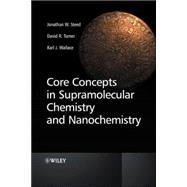
David R. Turner was born in London, UK in 1979. He obtained his M.Sci. in Chemistry at King's College, London where he became interested in crystal nucleation and organimetallic anion sensors. He stayed on to do a Ph.D. with Jonathan Steed at King’s College and at Durham University, on urea-functionalised anion receptors, including tripodal organic host species and molecular tweezers. His work also involved aspects of crystal engineering and solid state phenomena involving transition metal/ureido systems. He graduated in 2004. In January 2005, he changed countries and disciplines to begin a post-doctoral position at Monash University, Melbourne, Australia with Professor Junk and Professor Glen Deacon, working on the synthesis and structural characterization of novel lanthanoid – pyrazolate complexes. In January 2006, he was awarded an Australian Research Council post-doctoral fellowship in collaboration with Dr. Stuart Batten at Monash University. His current research is focused on the synthesis and control of lanthanoid-containing coordination networks targeting systems and control magnetic properties, in addition to pursuing his interest in hydrogen bonding networks. Dr. Turner is the co-author of 20 scientific papers and is co-lecturer of the metallo-supramolecular course at his current university.
Karl J. Wallace was born in Essex (a true Essex boy!), UK in 1978. He obtained his B.Sc. at the University of the West of England, Bristol in 1999, where he developed an interest in inorganic chemistry and coordination polymers. He then completed a Ph.D. at King's College, London (2003), working with Jonathan W. Steed on the synthesis and binding studies of hosts for small molecular recognition. In 2003, he moved to the laboratories of Eric V. Anslyn at the University of Texas at Austin, USA as a post-doctoral fellow, synthesizing molecular 'scaffolds' for applications as practical sensor devices. In 2006, he was appointed as an Assistant Professor in Inorganic and Supramolecular chemistry at the University of Southern Mississippi, USA, where his research interests are in supramolecular chemistry, particularly molecular recognition and the synthesis of molecular sensor and devices.
| Preface | p. ix |
| About the authors | p. xi |
| Introduction | p. 1 |
| What is supramolecular chemistry? | p. 1 |
| Selectivity | p. 4 |
| Supramolecular interactions | p. 17 |
| Supramolecular design | p. 26 |
| References | p. 27 |
| Suggested further reading | p. 27 |
| Solution host-guest chemistry | p. 29 |
| Introduction: guests in solution | p. 29 |
| Macrocyclic versus acyclic hosts | p. 30 |
| Cation binding | p. 36 |
| Anion binding | p. 52 |
| Metal-containing receptors | p. 66 |
| Simultaneous cation and anion receptors | p. 73 |
| Neutral-molecule binding | p. 82 |
| Supramolecular catalysis and enzyme mimics | p. 97 |
| References | p. 104 |
| Self-assembly | p. 107 |
| Introduction | p. 107 |
| Biological self-assembly | p. 114 |
| Ladders, polygons and helices | p. 121 |
| Rotaxanes, catenanes and knots | p. 133 |
| Self-assembling capsules | p. 156 |
| References | p. 167 |
| Solid state supramolecular chemistry | p. 171 |
| Introduction | p. 171 |
| Zeolites | p. 172 |
| Clathrates | p. 179 |
| Clathrate hydrates | p. 187 |
| Crystal engineering | p. 194 |
| Coordination polymers | p. 209 |
| References | p. 225 |
| Nanochemistry | p. 229 |
| Introduction | p. 229 |
| Nanomanipulation | p. 233 |
| Molecular devices | p. 237 |
| Self-assembled monolayers (SAMs) | p. 254 |
| Soft lithography | p. 264 |
| Nanoparticles | p. 266 |
| Fullerenes and nanotubes | p. 272 |
| Dendrimers | p. 277 |
| Fibres, gels and polymers | p. 279 |
| Nanobiology and biomimetic chemistry | p. 284 |
| References | p. 293 |
| Index | p. 297 |
| Table of Contents provided by Ingram. All Rights Reserved. |
The New copy of this book will include any supplemental materials advertised. Please check the title of the book to determine if it should include any access cards, study guides, lab manuals, CDs, etc.
The Used, Rental and eBook copies of this book are not guaranteed to include any supplemental materials. Typically, only the book itself is included. This is true even if the title states it includes any access cards, study guides, lab manuals, CDs, etc.